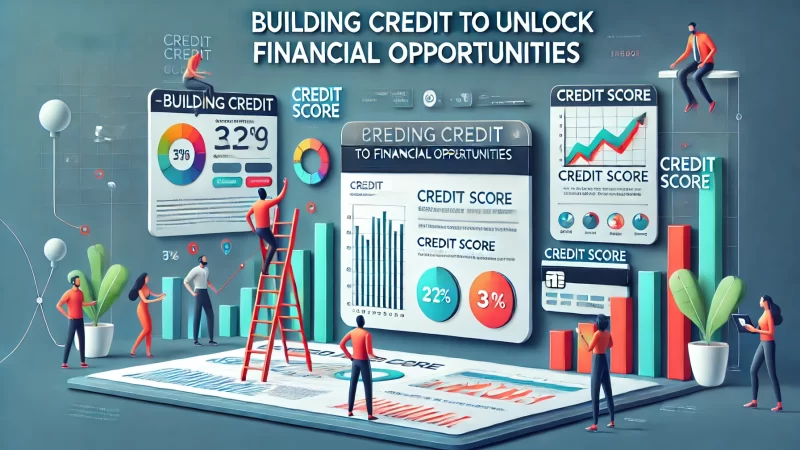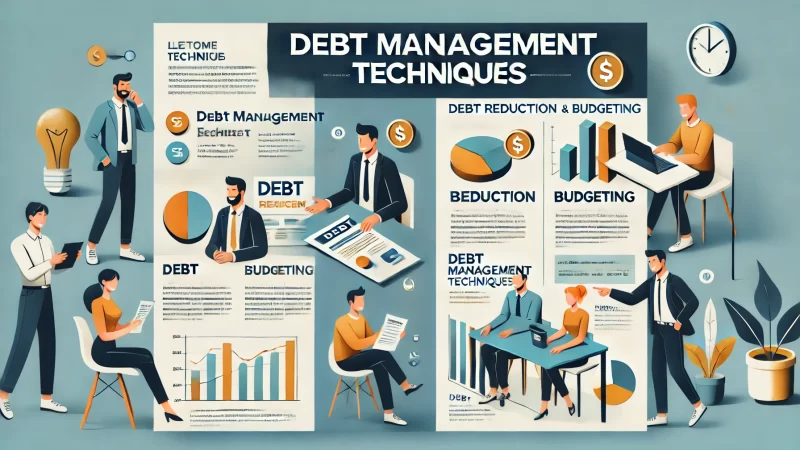Table of Contents
Are you ready to unlock the secrets of wealth-building and achieve financial success? What role does financial education play in this journey, and how can you apply practical strategies to secure your future?
Financial education is the foundation that equips you with the knowledge and tools to make informed decisions, avoid debt traps, and grow your wealth steadily. In this article, we’ll explore the most effective financial education tips that will help you build wealth and succeed financially.
Why Financial Education Is Essential For Wealth Building
Financial education provides the foundation for making informed decisions that directly impact your wealth. I believe understanding how to manage finances effectively is the first step to securing long-term wealth. Without this knowledge, even high earners can struggle to build sustainable wealth or achieve financial independence.
By mastering key financial concepts, I suggest you can unlock countless opportunities for growth. Financial education not only empowers individuals to control their finances, but also prevents costly mistakes like excessive debt or bad investments. This is why having a solid financial education is key to lasting success in wealth building.
Understanding The Key Components Of Financial Literacy
Financial literacy covers a range of essential topics that I consider the building blocks of wealth. These include budgeting, saving, investing, debt management, and understanding credit. Each of these components plays a critical role in achieving financial success. Mastering them gives you control over your finances, helping you make smarter decisions daily.
I have often emphasized the importance of learning about financial products like loans, interest rates, and insurance policies. Knowing the terms and implications of these products allows you to avoid financial pitfalls. In the long run, I believe this knowledge will save you time and money, creating more opportunities for wealth accumulation.
Budgeting is one of the core skills in financial literacy. It’s about more than just tracking income and expenses. It’s a proactive tool that allows you to prioritize goals and allocate resources efficiently. Understanding how to budget correctly can prevent overspending, and I feel it can lead to better financial control.
I also emphasize that debt management is crucial. Knowing how to handle different types of debt – such as mortgages, credit cards, and student loans – helps avoid financial burdens. By managing debt efficiently, you will have more disposable income to invest or save, which accelerates wealth growth.
Finally, I recommend focusing on understanding credit scores. A good credit score opens doors to lower interest rates and better financial opportunities. I advise maintaining a strong credit history to benefit from lower borrowing costs and greater financial flexibility in the future.
The Connection Between Financial Education And Long-Term Wealth
Financial education is the roadmap to long-term wealth. I think the connection lies in the ability to apply knowledge consistently over time. Those with a firm grasp on personal finance can avoid short-term setbacks that derail long-term goals. Without financial education, you may miss out on key wealth-building strategies, such as investing or saving effectively.
In my experience, consistent application of financial education principles leads to compounded growth. This means that small steps, such as saving a portion of your income or investing regularly, add up over time. The earlier you start, the more wealth you will accumulate due to the power of compound interest.
I’ve also noticed that financially educated individuals tend to make fewer emotional decisions when it comes to money. Whether it’s during market fluctuations or personal financial crises, a solid financial education provides the clarity needed to make rational choices. This avoids panic-based decisions that can lead to significant losses.
One thing I emphasize is the importance of lifelong learning. Financial markets and opportunities are always changing, so I recommend staying updated with the latest strategies. I find that keeping informed through books, podcasts, or financial advisors keeps you ahead of the curve, ensuring that your wealth continues to grow.
Lastly, I advise focusing on goal-setting as part of your financial education. Defining clear, measurable financial goals makes the process of wealth-building more tangible and achievable. Whether it’s planning for retirement or buying property, a well-structured financial plan turns your goals into reality.
Myths About Financial Education That Hinder Wealth Growth
There are many myths about financial education that, I believe, often hold people back. One common misconception is that only the wealthy need financial education. In reality, I know that financial literacy is crucial for everyone, regardless of income level. Understanding how to manage what you have is the first step to building more.
Another myth I’ve encountered is that financial education is too complex or difficult to learn. This couldn’t be further from the truth. Financial concepts are often simpler than they seem, and I recommend taking things step by step. The basics of budgeting, saving, and investing can be easily understood with the right resources.
I also feel that many people believe they can’t get ahead because they didn’t start early enough. While it’s true that starting young helps, I’ve found that it’s never too late to improve your financial situation. By applying financial principles now, you can still create significant positive changes in your wealth.
Some believe that financial education is only about cutting costs and being frugal. In reality, I think financial education is about creating a balance. It teaches you to spend wisely and save, but also how to grow your wealth through investments and smart financial planning. Being educated allows you to enjoy life while still securing your future.
Lastly, I notice a myth that people think wealth comes only from a high-paying job. While a good income helps, I’ve learned that wealth-building is more about how you manage money. Even those with modest incomes can build wealth through consistent saving, smart investing, and avoiding debt traps.
How Budgeting Skills Strengthen Your Financial Foundation

Budgeting is the cornerstone of financial stability. I believe it gives you a clear picture of your financial situation, helping you control spending, save money, and invest wisely. A solid budget aligns your financial actions with your goals, ensuring you always have a plan for where your money goes.
When I create a budget, I always feel more in control. It reduces the stress of unexpected expenses and makes achieving financial goals like paying off debt or saving for retirement much easier. A well-structured budget is key to building wealth and maintaining financial health over time.
Creating A Simple, Effective Budget For Beginners
When starting with budgeting, I suggest keeping things simple. Track all your income and expenses, then categorize them into needs, wants, and savings. This helps you prioritize your spending and find areas where you can cut back. Even small changes, like reducing unnecessary expenses, can add up over time.
I often advise beginners to use the 50/30/20 rule. This guideline allocates 50% of your income to necessities, 30% to discretionary spending, and 20% to savings and debt payments. It’s an easy framework to follow that ensures you’re saving consistently while still enjoying some flexibility.
To simplify budgeting further, I find that using apps like Mint or YNAB (You Need A Budget) helps. These apps automatically track your expenses and categorize them, making it easier to stick to your budget. I recommend them for anyone who feels overwhelmed by manual budgeting.
In my experience, it’s essential to review your budget regularly. Financial situations change, so I advise adjusting your budget as needed. This ensures your budget remains relevant and effective as your goals or income evolve. Regularly revisiting your budget keeps you on track toward your financial goals.
Lastly, I recommend setting small, achievable financial goals. These provide motivation and a sense of accomplishment. For instance, I suggest aiming to save a specific amount each month or reduce dining-out expenses. Achieving these smaller goals makes it easier to stay committed to long-term financial success.
Identifying Financial Priorities To Maximize Budget Efficiency
Setting clear financial priorities helps you maximize your budget’s efficiency. I advise identifying your most important financial goals, such as paying off debt, saving for retirement, or building an emergency fund. These priorities guide your spending and ensure your budget aligns with your long-term wealth-building objectives.
I always recommend starting with high-interest debt. Paying this off first saves you money on interest and frees up cash for saving or investing. I’ve seen how tackling debt quickly can make a significant difference in one’s financial health and future wealth prospects.
Another priority I emphasize is building an emergency fund. I suggest setting aside enough to cover 3-6 months of living expenses. This safety net protects you from financial crises, like unexpected medical bills or job loss, and ensures you don’t have to rely on credit or loans during tough times.
When I plan my budget, I focus on long-term investments as a priority. Allocating funds to retirement accounts, like a 401(k) or IRA, or other investment vehicles ensures your money grows over time. I recommend prioritizing these contributions to build wealth steadily through the power of compound interest.
I also advise considering your personal values when setting priorities. Aligning your financial goals with what matters most to you – whether it’s homeownership, travel, or education – makes budgeting more meaningful. By focusing on these priorities, you’re more likely to stick to your financial plan and achieve long-term success.
How To Avoid Common Budgeting Pitfalls
Many budgeting pitfalls can derail your financial progress, and I advise avoiding them. One common mistake is underestimating expenses. I recommend accounting for every expense, including small or irregular costs, to avoid budget shortfalls. Keeping detailed records prevents overspending and helps maintain an accurate financial plan.
Another pitfall I notice is unrealistic goal-setting. While it’s great to be ambitious, I suggest setting achievable, incremental financial goals to stay motivated. Failing to meet overly ambitious targets can lead to frustration and cause people to abandon their budgets entirely.
Impulse spending is a major budget killer. I advise practicing mindful spending by setting aside a small portion of your budget for discretionary purchases. This prevents guilt and ensures that you don’t overspend on non-essential items. Sticking to your budget requires discipline, but it’s possible with careful planning.
I’ve also found that some people fail to adjust their budget over time. As your income and expenses change, I recommend regularly reviewing your budget to make sure it reflects your current financial situation. A static budget can quickly become ineffective if it doesn’t evolve with your life changes.
Lastly, I advise against relying solely on credit for expenses that don’t fit into your budget. This leads to debt accumulation and financial strain. Instead, I suggest saving for larger purchases or adjusting your budget to accommodate them. Staying within your financial limits is critical for long-term wealth-building success.
Mastering The Art Of Saving For A Wealthy Future

Saving is one of the most powerful tools for building long-term wealth. I suggest developing a saving habit that aligns with your financial goals, whether it’s for emergencies, investments, or future needs. Over time, disciplined saving creates a financial cushion that empowers you to take advantage of opportunities.
I believe saving for the future isn’t just about setting money aside but doing so in a way that maximizes its growth. With the right approach, your savings can work for you, multiplying through strategic methods like investing or earning interest. In this section, we’ll explore key strategies that will help you save more effectively.
Proven Saving Techniques To Accelerate Wealth Accumulation
One of the first saving techniques I recommend is paying yourself first. This means allocating a portion of your income to savings before covering other expenses. By treating savings as a priority, I’ve seen how quickly wealth can accumulate. It’s a habit that builds a strong foundation for financial growth.
Another technique I find useful is automating your savings. By setting up automatic transfers from your paycheck to a savings account, you reduce the temptation to spend. I’ve noticed how this simple trick makes saving easier because it’s out of sight and out of mind. The result is steady growth in your savings without much effort.
Setting clear savings goals is also essential. I advise breaking them down into short-term and long-term objectives. Whether it’s saving for a vacation or retirement, having a tangible goal keeps you motivated. I find that when you attach a purpose to your savings, it becomes more rewarding to see the progress.
Cutting unnecessary expenses is another technique that accelerates savings. I’ve learned that small adjustments like brewing coffee at home or canceling unused subscriptions can lead to significant savings over time. It’s not about depriving yourself, but rather making smarter spending choices to achieve larger financial goals.
Lastly, I emphasize the importance of reviewing and adjusting your savings plan regularly. As your income or financial situation changes, so should your saving strategy. I’ve found that increasing the amount you save with every raise or bonus helps you stay on track for wealth accumulation, without feeling a significant impact on your lifestyle.
The Power Of Automated Savings And Compounding Interest
Automating your savings can be one of the most effortless ways to build wealth. I’ve seen that when people set automatic transfers into their savings or investment accounts, they tend to save more consistently. It removes the temptation to spend and ensures that savings happen regularly, no matter what.
Compounding interest is the true secret to growing your wealth over time. I recommend putting your money into accounts or investments that offer interest, as the compounding effect will exponentially grow your savings. The earlier you start, the more powerful compounding becomes, turning even small contributions into significant sums.
One of the best things I learned about automated savings is how it promotes consistency. By setting up automatic transfers, you make saving a priority without thinking about it. This steady contribution to your savings over months or years adds up, especially when combined with the effects of compounding interest.
I’ve also found that pairing automated savings with high-interest accounts maximizes your wealth growth. Whether it’s a high-yield savings account or investment account, you want your money to work for you while you sleep. The compounding interest earned monthly or annually can substantially boost your financial reserves.
Lastly, I suggest reviewing your savings rates periodically. You may want to increase the automated amount whenever you get a raise or come into extra income. I know that staying committed to automating your savings is one of the best financial habits for building long-term wealth and securing a prosperous future.
Establishing A Solid Emergency Fund: A Key Wealth Strategy
An emergency fund is one of the most important elements of a solid financial plan. I advise setting aside three to six months’ worth of living expenses in an easily accessible account. This provides a financial safety net in case of unexpected life events like job loss or medical emergencies, helping you avoid high-interest debt.
Building an emergency fund starts small, but I’ve seen how quickly it can grow with consistent contributions. I recommend setting aside a percentage of each paycheck into a separate savings account. Over time, this practice creates a financial buffer that brings peace of mind and stability during uncertain times.
I believe the key to a successful emergency fund is keeping it liquid. You should be able to access this money quickly, without penalties or delays. I suggest using a high-yield savings account or money market account that allows you to earn interest while keeping the funds readily available for emergencies.
I’ve noticed that too many people underestimate the importance of an emergency fund until they need one. Without this financial cushion, unexpected expenses can derail your savings or force you to take on debt. I emphasize that having an emergency fund in place prevents setbacks and keeps you on track toward your financial goals.
Finally, I recommend periodically reassessing your emergency fund. Life changes, such as a growing family or increased living expenses, may require you to adjust the size of your fund. I advise checking your emergency savings at least once a year to ensure it still provides adequate coverage for your needs.
Why Investing Wisely Is The Cornerstone Of Financial Success

Investing is essential for growing your wealth over time. I often highlight how saving alone won’t get you to financial freedom, especially with inflation eating away at your savings. Investing gives your money the potential to grow exponentially, providing opportunities for long-term financial success and security.
I believe the key to successful investing is having a strategy and sticking to it. By choosing the right investments and managing risk, you can build a portfolio that helps you achieve your financial goals. In this section, we’ll explore how to invest wisely and the strategies that can maximize your returns.
Understanding Different Investment Options For New Investors
As a new investor, I suggest starting with basic, low-risk options like index funds or exchange-traded funds (ETFs). These offer diversification across many stocks and bonds, which reduces risk. I’ve seen that these options are great for beginners because they provide steady growth without requiring deep investment knowledge.
Stocks, bonds, and real estate are common investment vehicles, but I advise balancing your portfolio. While stocks offer the potential for high returns, they can be volatile. Bonds, on the other hand, are more stable but offer lower returns. I recommend a mix of both, depending on your risk tolerance and financial goals.
If you’re feeling more adventurous, I suggest exploring real estate or peer-to-peer lending. These can provide higher returns but often come with more risk. I’ve heard of people using these alternative investments to diversify their portfolios further, but it’s crucial to understand the risks before diving in.
Another investment option I often recommend is retirement accounts like a 401(k) or IRA. These accounts not only offer tax advantages but also allow your investments to grow over the long term. I suggest contributing as much as possible, especially if your employer offers a matching contribution – it’s free money!
For new investors, I always emphasize starting with education. Before making any decisions, I recommend learning the basics of investing and understanding how markets work. There are plenty of books, podcasts, and online courses that can help you gain confidence in your investment choices.
Diversification: The Secret To Mitigating Investment Risk
Diversification is one of the most important strategies I’ve learned for reducing investment risk. By spreading your money across different asset classes, you reduce the chances of losing everything if one investment performs poorly. I recommend diversifying your portfolio with a mix of stocks, bonds, and alternative investments.
I also emphasize the importance of geographic diversification. Investing in international markets spreads risk and provides exposure to growing economies outside of your home country. I’ve noticed that this strategy can boost returns while protecting your portfolio from market downturns in a single region.
Another layer of diversification comes from varying industries and sectors. I recommend avoiding putting all your money into a single sector, such as technology or real estate. Instead, I find it’s beneficial to invest across multiple industries, so you’re protected if one sector underperforms.
While diversifying across asset types is key, I also suggest looking at different time horizons. Some investments, like bonds, may be more stable in the short term, while stocks typically perform better over the long term. A blend of short- and long-term investments helps balance risk and reward.
Lastly, I’ve found that regularly rebalancing your portfolio is important. Over time, some investments will grow faster than others, throwing off your intended asset allocation. I recommend reviewing your portfolio at least once a year and making adjustments to ensure it aligns with your financial goals and risk tolerance.
Long-Term Investment Strategies For Sustainable Growth
Investing for the long term requires patience, but I believe it’s the most reliable way to build sustainable wealth. I suggest focusing on strategies like dollar-cost averaging, where you invest a fixed amount regularly, regardless of market conditions. This smooths out volatility and takes the guesswork out of market timing.
One long-term strategy I recommend is investing in growth stocks. These companies reinvest their profits to expand, providing potential for significant price appreciation. While they can be riskier, I’ve seen how growth stocks can deliver higher returns over time compared to more conservative investments.
I advise looking into dividend-paying stocks as well. These stocks not only provide regular income through dividends but also offer the potential for capital appreciation. I’ve noticed that dividend stocks can be a great way to generate passive income while still growing your wealth in the long run.
Another key to long-term investing is having a buy-and-hold mentality. I suggest avoiding the temptation to sell your investments during market downturns. Historically, markets have always recovered, and those who stayed invested often came out ahead. I’ve learned that time in the market is more important than timing the market.
Finally, I recommend keeping your investment costs low. Fees and commissions can eat into your returns over time, so I suggest choosing low-cost investment options like index funds or ETFs. Over the long term, minimizing costs can significantly boost your overall investment returns and help you achieve sustainable growth.
Building Credit To Unlock Financial Opportunities

Building credit is crucial for anyone looking to unlock financial opportunities. I believe that strong credit provides access to better interest rates, credit cards, and loans, making it easier to finance major purchases like homes or cars. Without good credit, I’ve seen people struggle with higher costs and fewer financial options.
I recommend treating your credit as a tool for wealth-building. The better your credit score, the more affordable your financial journey becomes. Building credit responsibly leads to lower interest rates, which saves you money over time. This can free up cash flow for investing or saving, helping you grow your wealth faster.
Why A Strong Credit Score Matters For Wealth Building
A strong credit score opens doors to low-interest loans, which I find vital for making significant financial moves like purchasing property. The lower the interest rate, the less you pay over time, freeing up funds for saving or investing. I recommend focusing on building a high credit score to maximize these opportunities.
I also notice that a good credit score provides leverage when negotiating loan terms. Lenders are more willing to offer favorable conditions to individuals with excellent credit. This not only saves you money but positions you to take advantage of opportunities that can significantly impact your wealth-building strategy.
I’ve heard how essential credit scores are for non-traditional opportunities, too. For instance, strong credit can help you secure better rates on insurance or rental agreements. I suggest seeing your credit score as more than just a borrowing tool—it’s also a way to unlock cost savings across many areas of life.
One thing I’ve learned is that a high credit score can enhance your investment potential. For example, securing a low-interest mortgage allows you to invest more capital in property or other ventures. Over time, the wealth generated from these investments far exceeds the cost of borrowing at a low rate.
Lastly, I recommend thinking long term. The stronger your credit score, the more financial freedom you gain over time. This freedom allows you to seize opportunities when they arise, like investing in new businesses or real estate, which can accelerate your journey to wealth accumulation.
Tips For Building And Maintaining A High Credit Score
Paying bills on time is one of the most effective ways I know to maintain a strong credit score. I recommend setting reminders or automating payments to avoid late fees, which can damage your score. Over time, consistent on-time payments build trust with lenders and strengthen your financial profile.
Another tip I advise is keeping your credit utilization low. I suggest using only 30% or less of your available credit limit. This shows lenders that you’re responsible with credit, which improves your score. I find that maintaining a low utilization rate over time leads to noticeable improvements in credit health.
Reviewing your credit report regularly is a step I emphasize. I recommend checking for any inaccuracies or fraudulent activities that could harm your credit score. If you spot something wrong, disputing it quickly can prevent long-term damage. Staying proactive about your credit ensures it remains strong.
Limiting the number of new credit applications is another strategy I’ve found helpful. Each application results in a hard inquiry, which can lower your score. I advise being selective when applying for new credit cards or loans and spacing out applications to minimize their impact on your score.
Finally, I think diversifying your credit types, such as having a mix of installment loans and revolving credit, can boost your score. This demonstrates to lenders that you can manage different types of credit responsibly. I recommend not opening unnecessary accounts, though—focus on maintaining the ones you have.
How To Use Credit Wisely Without Falling Into Debt Traps
I advise using credit like a tool—it should be a means to an end, not a financial burden. One way to avoid debt traps is to only charge what you can afford to pay off in full each month. I’ve noticed that this helps avoid interest charges and keeps you in control of your finances.
I also recommend setting a budget for credit card use. Decide in advance how much you’re willing to spend on credit and stick to that limit. This prevents impulse purchases and ensures that your spending aligns with your financial goals. Staying disciplined with your credit usage builds long-term financial health.
Avoiding cash advances on credit cards is something I always suggest. The fees and high interest rates on cash advances can quickly spiral out of control. I advise treating your credit card as a tool for convenience, not as a cash flow supplement, to keep from accumulating unmanageable debt.
I also believe in paying more than the minimum balance each month. Paying only the minimum leads to interest accumulation, which can turn small debts into big problems. By paying off your balance in full or as much as possible, you stay ahead of the curve and protect your credit score from taking a hit.
Lastly, I recommend keeping an eye on your spending habits. If you notice that you’re relying on credit cards to cover daily expenses, it may be time to reassess your budget. I suggest using credit for strategic purchases that you can repay promptly, rather than as a crutch for covering short-term cash flow gaps.
Debt Management Techniques To Stay Financially Healthy

Managing debt is crucial for long-term financial health. I advise staying proactive with your debt, whether it’s credit card balances, student loans, or mortgages. By paying off debt strategically, you free up cash for saving or investing, which are both critical for building wealth over time.
I also suggest tracking all your debts and understanding the interest rates associated with each one. By prioritizing high-interest debts, you minimize the financial drain caused by interest accumulation. This approach ensures you’re paying off debt in the most efficient way, giving you more room to grow your wealth.
Strategies To Eliminate Debt And Free Up Cash Flow
One strategy I often recommend is the debt snowball method. With this approach, you focus on paying off your smallest debt first while making minimum payments on others. As each debt is eliminated, I find that momentum builds, motivating you to continue tackling bigger debts and freeing up cash flow.
Alternatively, I suggest the debt avalanche method. Here, you focus on paying off debts with the highest interest rates first. I’ve seen how this method minimizes the total interest paid over time, accelerating your progress toward debt freedom. It’s particularly effective for those with high-interest credit card debt.
Negotiating lower interest rates is a technique I suggest exploring. I’ve heard that some lenders may reduce your interest rates if you’ve been a loyal customer or have a solid repayment history. This reduces the financial burden and accelerates your journey toward being debt-free.
Another effective strategy I emphasize is creating a realistic budget that allocates extra funds toward debt repayment. I recommend cutting back on unnecessary expenses temporarily to increase your debt payments. The faster you pay off debt, the more cash flow you’ll have for wealth-building activities like saving and investing.
Finally, I believe building an emergency fund is crucial even while paying off debt. I’ve noticed that having a small financial cushion prevents you from relying on credit cards when unexpected expenses arise. This keeps you from sliding back into debt while you work on becoming financially free.
Consolidating Debt: Is It A Smart Move For Your Finances?
Debt consolidation can simplify your financial life by combining multiple debts into one payment. I suggest exploring this option if you’re struggling with multiple high-interest debts. Consolidating at a lower interest rate can save money and make debt management easier. However, I believe it’s essential to weigh the costs and benefits.
I also recommend using a debt consolidation loan cautiously. While it can streamline your payments, it’s crucial to avoid accumulating new debt once your existing debts are consolidated. I advise viewing debt consolidation as a chance to simplify your financial plan, not a quick fix for poor spending habits.
Debt consolidation can be an effective tool for managing credit card debt. I suggest transferring your balances to a card with a lower interest rate or a 0% introductory rate. I’ve seen how this reduces interest payments and accelerates debt repayment, but only if you commit to paying off the balance during the promotional period.
I advise considering personal loans for consolidation. Personal loans often come with lower interest rates than credit cards, making them a smart option for consolidating high-interest debts. However, I recommend being cautious about the loan terms and fees, as these can eat into your savings.
Lastly, I believe you should be mindful of the impact on your credit score. Consolidating debt may initially lower your score due to hard inquiries or closing old accounts, but over time, reducing your debt load can improve it. I recommend monitoring your credit closely and ensuring consolidation is part of a broader debt elimination strategy.
How To Avoid High-Interest Debt That Stunts Wealth Growth
High-interest debt can be a major roadblock to wealth building. I recommend avoiding payday loans or high-interest credit cards, as they trap you in a cycle of debt. These loans carry extremely high interest rates, making it nearly impossible to pay down the principal. I advise steering clear of these at all costs.
If you find yourself with high-interest debt, I suggest prioritizing its repayment. High-interest debt drains your financial resources and keeps you from reaching your wealth goals. By paying it off as quickly as possible, you free up cash flow for more productive uses like saving or investing.
I also recommend avoiding minimum payments. Paying only the minimum on high-interest debt means most of your payment goes toward interest, not the principal. I’ve seen how this can keep you in debt for years. I suggest paying as much as you can afford each month to reduce the total interest paid.
To prevent high-interest debt, I suggest using a credit card with rewards and paying off the balance in full each month. This way, you avoid interest charges while benefiting from perks like cashback or travel rewards. I find this strategy works well for those disciplined enough to manage their spending.
Finally, I emphasize building an emergency fund to avoid relying on credit in times of need. When unexpected expenses arise, having cash on hand prevents you from turning to high-interest loans or credit cards. This keeps you financially stable and protects your wealth-building efforts from unnecessary setbacks.
The Role Of Retirement Planning In Wealth Building

Retirement planning plays a crucial role in building lasting wealth. I believe that without a well-structured retirement plan, it’s easy to underestimate how much you’ll need for a comfortable future. By starting early and making consistent contributions, you can ensure that your wealth continues to grow long after you stop working.
I recommend incorporating retirement planning into your broader wealth-building strategy. The right plan not only provides financial security but also allows you to take advantage of tax benefits and compound interest. With proper retirement planning, you can enjoy your later years without financial stress while continuing to grow your wealth.
Why You Should Start Retirement Planning Early
I’ve noticed that starting retirement planning early gives you the most significant advantage—time. The earlier you begin saving, the more time your investments have to grow through compound interest. Even small, consistent contributions can lead to substantial growth over several decades, making early planning critical.
Another reason I suggest starting early is that it reduces financial pressure later on. You won’t have to save large amounts at once if you spread your contributions over a long period. I find that making retirement contributions a habit early in your career allows for steady progress toward your financial goals.
I also advise early retirement planning because it offers more flexibility. When you start young, you have the luxury of taking on more aggressive investment strategies, like stocks, which yield higher returns. As time passes, you can shift to more conservative investments, ensuring your wealth is protected while still growing.
I’ve heard from many people who regret delaying retirement savings because they lost out on years of potential growth. I always emphasize that the opportunity cost of waiting is high. Starting sooner gives you peace of mind, knowing you’re building a solid foundation for your future.
Lastly, early retirement planning reduces the chances of needing to work longer than expected. I’ve seen people who delay planning having to extend their careers simply because they didn’t save enough. I believe planning early ensures that you can retire when you want, not when your finances dictate.
Types Of Retirement Accounts And How To Maximize Them
One of the most common retirement accounts I recommend is the 401(k), especially if your employer offers a match. Employer matching is essentially free money, so I always advise contributing at least enough to receive the full match. Over time, this significantly boosts your retirement savings.
Another great option is an Individual Retirement Account (IRA). I suggest opening either a traditional or Roth IRA, depending on your tax situation. The Roth IRA is especially beneficial for young professionals since withdrawals during retirement are tax-free. This means your money grows tax-free for years.
Maximizing contributions to your retirement accounts is key to building wealth. I recommend contributing as much as you can afford, especially if you’re under 50 and eligible for catch-up contributions. The more you save now, the less you’ll have to worry about later, as these funds can grow substantially over time.
Diversifying within your retirement accounts is another strategy I emphasize. I suggest investing in a mix of stocks, bonds, and index funds to manage risk while still pursuing growth. A balanced portfolio protects your savings against market volatility while ensuring steady wealth accumulation.
Finally, I think it’s essential to review your retirement accounts regularly. Markets change, and so do your financial goals, so I advise reassessing your strategy at least once a year. This ensures that your investments are aligned with your risk tolerance and retirement timeline.
Adjusting Your Retirement Goals For Changing Life Circumstances
Life is unpredictable, and I recommend adjusting your retirement goals to reflect significant changes. Whether it’s marriage, starting a family, or a career shift, your financial needs evolve over time. I advise revisiting your retirement plan regularly to ensure it aligns with your current circumstances and future goals.
When your income changes, I suggest adjusting your retirement contributions accordingly. For example, a raise or new job might give you the ability to increase savings, while periods of financial strain may require scaling back. I’ve found that being flexible with your plan helps you stay on track without feeling overwhelmed.
I’ve also noticed that healthcare costs often rise as we age, so factoring in future medical expenses is critical. I recommend including a Health Savings Account (HSA) or long-term care insurance as part of your retirement planning. These tools can help you cover health-related expenses without depleting your retirement savings.
Another adjustment I often advise is revisiting your investment strategy as you approach retirement. In your younger years, you can afford to take more risks. However, I suggest gradually shifting toward more conservative investments, such as bonds, as you near retirement to protect your nest egg from market downturns.
Lastly, if you experience any major life events—like a divorce, a significant health issue, or even receiving an inheritance—I suggest reassessing your retirement timeline and goals. I believe that staying adaptable and responsive to life’s changes ensures your retirement plan remains solid and achievable.
Financial Education Resources To Help You Stay On Track
Continuing your financial education is vital for staying on track toward your wealth goals. I recommend seeking out resources that enhance your understanding of budgeting, investing, and saving. Whether you’re just starting or looking to fine-tune your strategy, financial education helps you make informed decisions that grow your wealth.
I also suggest using a combination of learning tools—such as books, podcasts, and online courses—to stay updated on the latest financial strategies. The more you know, the better you can adapt to changing economic conditions and opportunities. This section will highlight some of the best resources to expand your financial knowledge.
Books, Podcasts, And Courses To Boost Financial Literacy
Books are an excellent way to deepen your financial knowledge. I recommend starting with classics like “Rich Dad Poor Dad” by Robert Kiyosaki or “The Intelligent Investor” by Benjamin Graham. These books provide timeless insights into wealth-building strategies that are easy to understand, even for beginners.
Podcasts are another great resource. I suggest tuning into shows like “The Dave Ramsey Show” or “BiggerPockets Money Podcast“. These programs cover a wide range of financial topics, from debt management to real estate investing. I find that podcasts are a convenient way to learn on the go.
For those who prefer structured learning, I advise looking into online courses. Websites like Coursera and Udemy offer comprehensive courses on personal finance, investing, and retirement planning. I’ve found that these courses can provide detailed knowledge at your own pace, allowing you to focus on areas where you need improvement.
I also recommend joining online communities or forums that focus on personal finance. Engaging with others who share your financial goals provides motivation and access to diverse perspectives. I’ve noticed that learning from others’ experiences often accelerates your own financial progress.
Lastly, I suggest subscribing to financial newsletters or blogs. These resources provide ongoing education and updates on financial trends. I believe staying informed about the latest news and strategies keeps you ahead of the curve and enables you to make smarter financial decisions.
How To Leverage Online Tools For Better Financial Management
There are numerous online tools designed to help you manage your finances more effectively. I recommend using budgeting apps like Mint or YNAB (You Need a Budget) to track your income and expenses. These tools help you stay organized, ensuring you stick to your financial plan without overspending.
Investment platforms like Robinhood or Vanguard are also helpful for beginners. I suggest these tools if you’re new to investing, as they offer user-friendly interfaces and educational resources. I’ve found that these platforms make it easy to start investing with small amounts and gradually build your portfolio.
For retirement planning, I advise using retirement calculators like those found on NerdWallet or Fidelity’s website. These calculators allow you to project how much you need to save to meet your retirement goals. I think this is a simple way to ensure that you’re on track without needing extensive financial knowledge.
I’ve also heard great feedback about debt payoff apps like Debt Payoff Planner. These apps help you strategize how to pay off your debts efficiently, saving you both time and money. I believe using these tools can reduce the stress of managing debt, allowing you to focus on growing your wealth.
Lastly, I suggest using credit monitoring tools like Credit Karma or Experian. These platforms provide real-time updates on your credit score and offer tips for improving it. I’ve noticed that maintaining a healthy credit score is critical for unlocking financial opportunities, and these tools make it easier to manage your credit health.
The Value Of A Financial Advisor: When To Seek Professional Help
A financial advisor can be an invaluable resource when navigating complex financial decisions. I recommend seeking professional help if you’re unsure about investing, tax strategies, or retirement planning. A skilled advisor can provide personalized advice tailored to your specific goals, ensuring you stay on the right path.
If you’re approaching a major life event—such as buying a home, starting a business, or preparing for retirement—I suggest consulting a financial advisor. I’ve learned that these professionals can help clarify complicated financial decisions, offering insights that save you time and potential mistakes.
For those with substantial wealth or assets, I believe a financial advisor is particularly useful. They can offer advanced strategies for tax planning, estate management, and investments. I’ve seen how their guidance can help protect and grow your wealth, especially as your financial situation becomes more complex.
However, I recommend ensuring that any advisor you choose is a fiduciary. Fiduciaries are legally required to act in your best interest, which I think is crucial for maintaining trust and avoiding conflicts of interest. This ensures that the advice you receive is genuinely aligned with your financial well-being.
Lastly, I suggest considering a financial advisor if you lack time or expertise to manage your own finances. While DIY financial management works for many, I’ve found that having an expert can provide peace of mind, knowing your financial future is being handled by someone with experience and insight.






